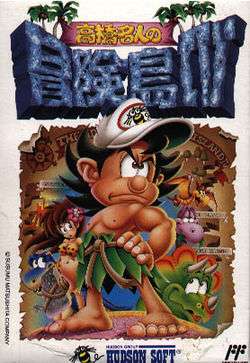Master Takahashi's Adventure Island IV
| Master Takahashi's Adventure Island IV | |
|---|---|
 Cover art | |
| Developer(s) | Now Production |
| Publisher(s) | Hudson Soft[1] |
| Designer(s) | Nobuyuki Shinohara |
| Series | Adventure Island |
| Platform(s) | Family Computer[1] |
| Release | |
| Genre(s) | Action/Adventure platformer,[1] Metroidvania[2] |
| Mode(s) | Single-player |
Master Takahashi's Adventure Island IV (高橋名人の冒険島Ⅳ "Takahashi Meijin no Bōken Jima IV") is a 1994 platform game released by Hudson Soft for the Family Computer; it was the final game released for the console, 9 years before its discontinuation in 2003.
Summary

Master Takahashi's Adventure Island IV is the fourth and final Adventure Island game released for the Famicom. It bears the distinction of being the final official Family Computer game in Japan and was never officially released for the international market. Unlike previous entries in the Adventure Island series, Bōken Jima IV plays less like a linear platformer and more of an action/adventure platformer, similar to the later Wonder Boy games. Adventure Island IV also has a unique password system that the earlier games in the series didn't have. It also features an egg item that allows the player character to teleport to the special spot where the player puts it. There is a large variety of weapons to choose from which are unlocked by the player throughout the game. Many special items can be won in races and challenges, such as an angel/fairy item that allows the player character to re-spawn once, at the spot where they lost all hearts and even an compass that acts like a map showing the player with an arrow where to go. Whereas in the earlier Adventure Island games the player character had a food meter and when it runs out, the player lost a life, in Adventure Island IV, the player simply collects 8 food items to regain 1 heart as health.
Story
The evil Eggplant Wizard kidnaps Master Higgins helpful creatures and later his girlfriend Tina, Master Higgins starts an adventure to save them and stop the evil eggplant once and for all.
References
- 1 2 3 4 "Release information". GameFAQs. Archived from the original on 2009-05-07. Retrieved 2008-11-30.
- ↑ Szczepaniak, John. "Backtracking: The History of Metroidvania". GamesTM (116). Imagine Publishing. pp. 148–53.